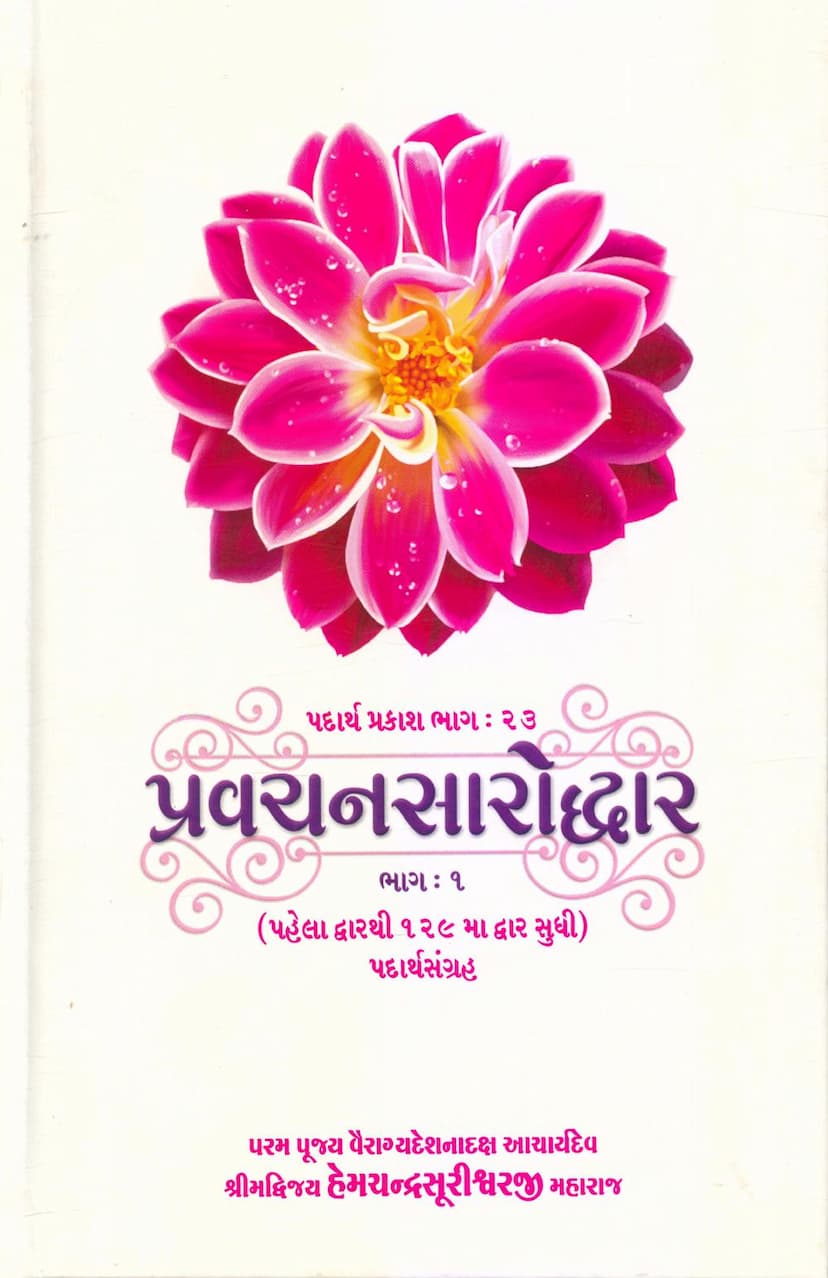Padarth Prakash 23 Pravachan Saroddhar Part 01
Added to library: September 2, 2025

Summary
Here's a comprehensive summary of the Jain text "Padarth Prakash 23 Pravachan Saroddhar Part 01," based on the provided pages:
Book Title: Padarth Prakash Part 23: Pravachan Saroddhar (Collection of Essentials), Part 1 (From Door 1 to Door 129)
Author: Acharya Shrimad Vijay Hemchandrasurishwarji Maharaj
Publisher: Sanghvi Ambalal Ratanchand Jain Dharmik Trust
Overview and Purpose:
This book, "Padarth Prakash Part 23," is the first volume of a two-part series titled "Pravachan Saroddhar" (Collection of Essentials from Discourses). The purpose of the "Padarth Prakash" series is to present the fundamental principles and concepts (padarthas) of Jainism in a concise, simple, and clear language. This particular volume covers the essentials from Door 1 to Door 129 of the original "Pravachan Saroddhar." The aim is to make complex Jain philosophical concepts accessible to a wider audience, including those who may not be well-versed in Sanskrit and Prakrit languages, as well as those who prefer brevity.
Origin and Source Material:
- The original text "Pravachan Saroddhar" was composed by Shri Nemichandrasuri Maharaj in Prakrit. It contains 1599 verses (gathas) divided into 276 sections called "Dwar" (Doors), which are further categorized into 9 divisions such as Vidhi-vibhag, Aradhana-vibhag, Sadhu-dharma-vibhag, Karma-sambandhi-vibhag, etc.
- This original work was later explained by Shri Siddhasen Suri in Sanskrit with a commentary called "Tattwaprakashini Vritti."
- The "Padarth Prakash Part 23" is compiled based on this original "Pravachan Saroddhar" and its commentary, focusing on the content from Door 1 to Door 129.
Content and Structure:
The book systematically presents Jain principles, organized into "Doors" (Dwar) and "Sub-Doors" (Pratidwar), covering a vast array of topics. The initial pages include dedications to esteemed Jain Acharyas and spiritual leaders, expressing reverence and seeking blessings. The publisher's note highlights the book's utility for students of Jain philosophy and expresses gratitude to the individuals and organizations involved in its publication.
The book then delves into a detailed breakdown of the content covered, listing the topics discussed in each Door. The summary indicates that this volume begins with topics related to Chaitya-vandan (worship of Jinalayas) and progresses through various rituals, conduct, and philosophical concepts.
Key Topics Covered (Illustrative Examples from the Table of Contents):
The table of contents provides a glimpse into the extensive scope of the book, covering:
- Chaitya-vandan: Rituals and practices associated with visiting and worshipping Jain temples.
- Pratikraman: The process of repentance and confession of transgressions.
- Pachchkhan (Vows and Restraints): Types of vows, acceptable and unacceptable foods and substances, and the principles of purification.
- Kaussargg: A specific meditative practice.
- Tirthankaras: Detailed information about the twenty-four Tirthankaras, including their names, parents, lineage, lifespan, height, disciples (Ganadharas and Pravartinis), Yaksas (attendant deities), and Devatas (guardian deities). This section is extensive, covering various aspects of their lives and accomplishments.
- Siddhas: Information about liberated souls (Siddhas), including their types, states, and locations.
- Doshas and Ashatanas: Various faults and offenses to be avoided, particularly in the context of worship and religious practice (e.g., 18 Doshas, 33 and 84 Ashatanas in Jinnalaya).
- Types of Arihants: Classification of Arihants.
- Vows and their Transgressions: Detailed explanation of the vows taken by monks and lay followers, along with their associated transgressions (Aticharas).
- Pachchkhan Types and Rules: Elaborate details on different types of vows, conditions (Agara), and their adherence.
- Vigais (Indulgent Foods) and their Classification: Identification of foods and substances that should be abstained from.
- Anantkayas (Plural Soul Entities) and Forbidden Items: Listing of plants and substances with a high concentration of souls or those considered impure.
- Practices and Disciplines: Information on various practices like Kaussargg, Pratikraman, and the discipline of monks and nuns.
- Conduct and Ethics: Detailed guidelines for monks, nuns, and lay followers regarding etiquette, behavior, and adherence to principles.
- Mudras (Hand Gestures) and their Significance: Explanation of various hand gestures used during worship.
- Subtleties of Jain Philosophy: Discussions on topics like the nature of attachment, the importance of knowledge, the path to liberation, and the significance of right faith (Samayaktva).
- Gurus and their Guidance: Emphasis on the importance of following the teachings and guidance of spiritual leaders.
- Invocations and Prayers: Mentions of specific prayers and mantras.
- Lists of Acharyas and their Works: The book lists numerous works authored or inspired by Acharya Vijay Hemchandrasurishwarji Maharaj, showcasing his prolific contribution to Jain literature.
Approach and Presentation:
The book is noted for its simplified language, making it easy to understand for a broad audience. It also employs visual aids like diagrams and tables in some places to further clarify concepts. The compilation aims to provide a "to the point" explanation of the "Pravachan Saroddhar's" essence, facilitating memorization and recitation.
Key Themes and Teachings:
- Understanding Jain Principles: The text underscores the necessity of understanding fundamental Jain principles for comprehending any religious scripture.
- The Essence of Jain Philosophy: "Pravachan Saroddhar" is presented as a core text that extracts the essence of Jain scriptures.
- Spiritual Growth: The study of the book is encouraged to spread the light of right knowledge (Samyagjnana) within one's soul and dispel the darkness of ignorance.
- Ethical Conduct: The extensive lists of Ashatanas (offenses) and Doshas (faults) highlight the Jain emphasis on meticulous ethical conduct in all aspects of life, especially in religious practices.
- Devotion and Reverence: The dedications and mentions of respected Acharyas and practices like Chaitya-vandan emphasize the importance of devotion and reverence in Jainism.
- Discipline and Practice: The detailed descriptions of various rituals, vows, and daily practices for monks and lay followers illustrate the rigorous discipline required for spiritual progress.
In essence, "Padarth Prakash 23" serves as a vital resource for understanding and practicing the core tenets of Jainism, making the profound teachings of the "Pravachan Saroddhar" accessible and digestible.